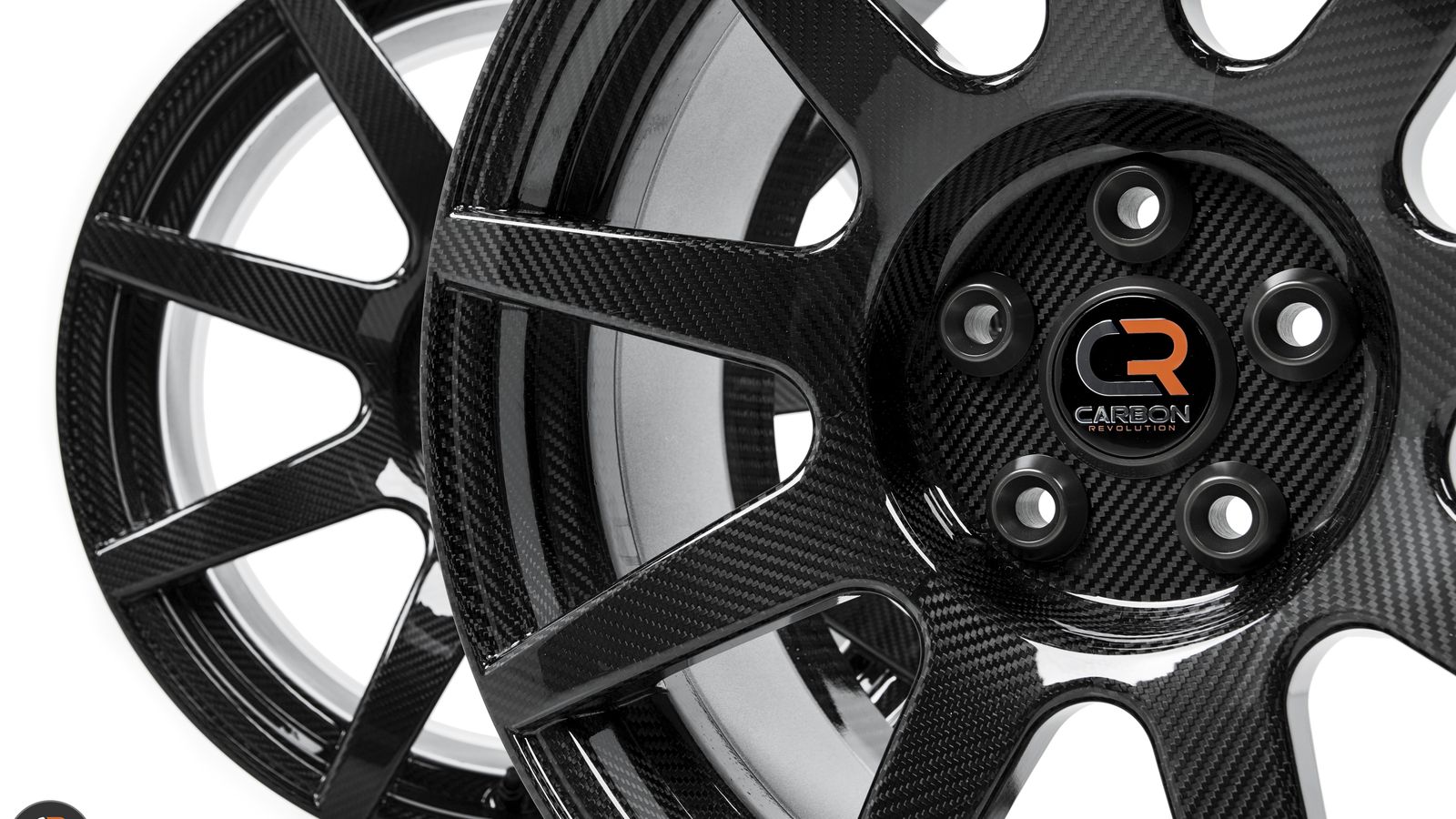
The History of Carbon Fiber Wheels
Contrary to popular belief, carbon fiber wheels are nothing new. They were first introduced to the world approximately 48 years ago. Michelin manufactured the first carbon resin reinforced wheels for French car brand Citroën back in 1971.
 The wheels were specifically created for Citroën's SM-based rally car. At that point Citroën had been rallying for decades; however, the ever-increasing weight of cars meant they struggled with weight reduction. The 3,300-pound vehicle was heavy enough to crush any alloy wheels. Michelin owned Citroën and got straight to work and produced what many considered to be plastic wheels. In the end, the resin wheels weighed less than half of the weight the wheels they replaced yet were strong enough to support the vehicle and the enduring stress of rallying.
The wheels were specifically created for Citroën's SM-based rally car. At that point Citroën had been rallying for decades; however, the ever-increasing weight of cars meant they struggled with weight reduction. The 3,300-pound vehicle was heavy enough to crush any alloy wheels. Michelin owned Citroën and got straight to work and produced what many considered to be plastic wheels. In the end, the resin wheels weighed less than half of the weight the wheels they replaced yet were strong enough to support the vehicle and the enduring stress of rallying.
At the time, the wheels were slightly different than their standard wheel counterparts. For starters, the wheel nuts and bolts were not of standard size, and specialized nuts and bolts were required. Due to the rounded edge of the rim, traditional clip-on wheel weights could not be installed, and so they had to use an early version of stick-on weights. The wheel hubs also had to be modified to accommodate the size of the resin wheels. Of these, it is said that only 30 sets were ever produced.
 The Citroën SM went on to win the Morocco Rally of 1971. Following the win, Citroën decided to offer the resin wheels to the public in 1972. They were only available in Europe as the wheels did not pass US federal safety regulations. They were not modified in any way, and the rounded rim meant wheel shops were introduced to early versions of stick-on wheel weights. In 1973, the wheels were updated to be used with regular wheel bolts and wheel hubs.
The Citroën SM went on to win the Morocco Rally of 1971. Following the win, Citroën decided to offer the resin wheels to the public in 1972. They were only available in Europe as the wheels did not pass US federal safety regulations. They were not modified in any way, and the rounded rim meant wheel shops were introduced to early versions of stick-on wheel weights. In 1973, the wheels were updated to be used with regular wheel bolts and wheel hubs.
 Although production of the resin wheels ended in 1975 when Citroën ceased making the SM, Michelin manufactured a second limited run in the mid-1980s. Citroën SM owners in the United States could purchase a set for $2,000 (equivalent to $6,000 in 2018 dollars).
Although production of the resin wheels ended in 1975 when Citroën ceased making the SM, Michelin manufactured a second limited run in the mid-1980s. Citroën SM owners in the United States could purchase a set for $2,000 (equivalent to $6,000 in 2018 dollars).
 Carroll Shelby and Dodge teamed up to produce the CSX in the 1980s. Their final version, the 1989 CSX-VNT, had a set of resin composite wheels dubbed "Fiberides." This marked the first time an American car company offered glass fiber reinforced wheels.
Carroll Shelby and Dodge teamed up to produce the CSX in the 1980s. Their final version, the 1989 CSX-VNT, had a set of resin composite wheels dubbed "Fiberides." This marked the first time an American car company offered glass fiber reinforced wheels.
 In 2013, Koenigsegg made history when it began manufacturing carbon fiber single-piece wheels for its supercars. A new set costs $40,000, in addition to the $2 million price tag for one of their cars.
In 2013, Koenigsegg made history when it began manufacturing carbon fiber single-piece wheels for its supercars. A new set costs $40,000, in addition to the $2 million price tag for one of their cars.
 As of the writing of this post, Porsche is the only mainstream automaker manufacturing single-piece carbon-fiber wheels in-house. For all other car brands offering carbon fiber wheels, the wheels are produced by the sole supplier: Carbon Revolution. Shortly after Carbon Revolution perfected the single-piece design, Ford teamed up with the company to use their single-piece carbon fiber wheels on the new Shelby GT350R and the new Ford GT. Carbon Revolution has also been working with Ferrari.
As of the writing of this post, Porsche is the only mainstream automaker manufacturing single-piece carbon-fiber wheels in-house. For all other car brands offering carbon fiber wheels, the wheels are produced by the sole supplier: Carbon Revolution. Shortly after Carbon Revolution perfected the single-piece design, Ford teamed up with the company to use their single-piece carbon fiber wheels on the new Shelby GT350R and the new Ford GT. Carbon Revolution has also been working with Ferrari.
 Aside from these manufacturers the only other player in the carbon fiber wheel industry in BMW. BMW has developed an alloy/carbon hybrid wheel that incorporates aluminum alloy spokes with a carbon fiber rim. They have been trying since 2014 to convince European legislators that this hybrid wheel is safe enough for the streets.
Aside from these manufacturers the only other player in the carbon fiber wheel industry in BMW. BMW has developed an alloy/carbon hybrid wheel that incorporates aluminum alloy spokes with a carbon fiber rim. They have been trying since 2014 to convince European legislators that this hybrid wheel is safe enough for the streets.
 The Citroën SM went on to win the Morocco Rally of 1971. Following the win, Citroën decided to offer the resin wheels to the public in 1972. They were only available in Europe as the wheels did not pass US federal safety regulations. They were not modified in any way, and the rounded rim meant wheel shops were introduced to early versions of stick-on wheel weights. In 1973, the wheels were updated to be used with regular wheel bolts and wheel hubs.
The Citroën SM went on to win the Morocco Rally of 1971. Following the win, Citroën decided to offer the resin wheels to the public in 1972. They were only available in Europe as the wheels did not pass US federal safety regulations. They were not modified in any way, and the rounded rim meant wheel shops were introduced to early versions of stick-on wheel weights. In 1973, the wheels were updated to be used with regular wheel bolts and wheel hubs.  Although production of the resin wheels ended in 1975 when Citroën ceased making the SM, Michelin manufactured a second limited run in the mid-1980s. Citroën SM owners in the United States could purchase a set for $2,000 (equivalent to $6,000 in 2018 dollars).
Although production of the resin wheels ended in 1975 when Citroën ceased making the SM, Michelin manufactured a second limited run in the mid-1980s. Citroën SM owners in the United States could purchase a set for $2,000 (equivalent to $6,000 in 2018 dollars).  Carroll Shelby and Dodge teamed up to produce the CSX in the 1980s. Their final version, the 1989 CSX-VNT, had a set of resin composite wheels dubbed "Fiberides." This marked the first time an American car company offered glass fiber reinforced wheels.
Carroll Shelby and Dodge teamed up to produce the CSX in the 1980s. Their final version, the 1989 CSX-VNT, had a set of resin composite wheels dubbed "Fiberides." This marked the first time an American car company offered glass fiber reinforced wheels. In 2013, Koenigsegg made history when it began manufacturing carbon fiber single-piece wheels for its supercars. A new set costs $40,000, in addition to the $2 million price tag for one of their cars.
In 2013, Koenigsegg made history when it began manufacturing carbon fiber single-piece wheels for its supercars. A new set costs $40,000, in addition to the $2 million price tag for one of their cars. As of the writing of this post, Porsche is the only mainstream automaker manufacturing single-piece carbon-fiber wheels in-house. For all other car brands offering carbon fiber wheels, the wheels are produced by the sole supplier: Carbon Revolution. Shortly after Carbon Revolution perfected the single-piece design, Ford teamed up with the company to use their single-piece carbon fiber wheels on the new Shelby GT350R and the new Ford GT. Carbon Revolution has also been working with Ferrari.
As of the writing of this post, Porsche is the only mainstream automaker manufacturing single-piece carbon-fiber wheels in-house. For all other car brands offering carbon fiber wheels, the wheels are produced by the sole supplier: Carbon Revolution. Shortly after Carbon Revolution perfected the single-piece design, Ford teamed up with the company to use their single-piece carbon fiber wheels on the new Shelby GT350R and the new Ford GT. Carbon Revolution has also been working with Ferrari.  Aside from these manufacturers the only other player in the carbon fiber wheel industry in BMW. BMW has developed an alloy/carbon hybrid wheel that incorporates aluminum alloy spokes with a carbon fiber rim. They have been trying since 2014 to convince European legislators that this hybrid wheel is safe enough for the streets.
Aside from these manufacturers the only other player in the carbon fiber wheel industry in BMW. BMW has developed an alloy/carbon hybrid wheel that incorporates aluminum alloy spokes with a carbon fiber rim. They have been trying since 2014 to convince European legislators that this hybrid wheel is safe enough for the streets.